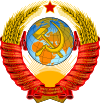Our website is made possible by displaying online advertisements to our visitors.
Please consider supporting us by disabling your ad blocker.
General secretaryship of Mikhail Gorbachev

| ||
|---|---|---|
|
Former General Secretary of the CPSU General Secretariate (1985–1991)
Presidency (1990–1991)
Foreign policy Post-leadership
Media gallery |
||
On 11 March 1985, Mikhail Gorbachev was elected the eighth General Secretary of the Communist Party of the Soviet Union by the Politburo of the CPSU after the death of Konstantin Chernenko. He was the last general secretary before the dissolution of the Soviet Union.
In 1978, he returned to Moscow to become a Secretary of the party's Central Committee; he joined the governing Politburo (25th term) as a non-voting candidate member in 1979 and a voting member in 1980.
While Gorbachev wanted to preserve the Soviet Union and Marxist-Leninist ideals, he recognised the need for significant reforms. He decided to withdrew troops from the Soviet–Afghan War and met with United States president Ronald Reagan at the Reykjavik Summit to discuss the limitation of nuclear weapons production and ending the Cold War. He also proposed a three-stage programme for abolishing the world's nuclear weapons by the end of the 20th century.
Domestically, his policy of glasnost ("openness") allowed for the improvement of freedom of speech and free press, while his perestroika ("restructuring") sought to decentralize economic decision-making to improve its efficiency. Ultimately, Gorbachev's democratization efforts and formation of the elected Congress of People's Deputies undermined the supremacy the CPSU had in Soviet governance. When various Warsaw Pact countries abandoned Marxist–Leninist governance in 1989, he declined to intervene militarily. Growing nationalist sentiment within constituent republics threatened to break up the Soviet Union, leading the hardliners within the Communist Party to launch an unsuccessful coup against Gorbachev in August 1991. After the attempted coup, the Soviet Union dissolved against Gorbachev's wishes.
After resigning from the presidency, he launched the Gorbachev Foundation, became a vocal critic of Russian presidents Boris Yeltsin and Vladimir Putin, and campaigned for Russia's social-democratic movement.
Previous Page Next Page




